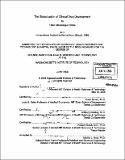The globalization of clinical drug development
Author(s)
Thiers, Fabio Albuquerque
DownloadFull printable version (3.041Mb)
Other Contributors
Harvard University--MIT Division of Health Sciences and Technology.
Advisor
Ernst Berndt and Anthony Sinskey.
Terms of use
Metadata
Show full item recordAbstract
Industry-sponsored clinical research of investigational drugs (also called clinical development) has traditionally been carried out in relatively developed countries in the North American, Western European, and Pacific regions. However, lately it has been widely reported that clinical trials starting now are becoming increasingly diffused globally, with significant growth of activity in so-called emerging economies in Eastern Europe, Latin America, and Southeast Asia. This change in location of clinical development activities has numerous implications for patients, health care providers, pharmaceutical companies, regulatory agencies and governments around the globe. Even though there is much debate about the topic, a public systematic quantitative assessment of the current status of the globalization of clinical drug development phenomenon is lacking. The objective of this thesis research is to provide such objective quantification while addressing some issues that are currently in active discussion. This thesis documents that the participation of emerging countries is still relatively small (13%) and they most commonly participate in very large (involving more than five countries) phase Ilb or III trials. (cont.) Albeit perceived as small, this participation is growing at a rapid pace (23% average annual growth rate) and the number of clinical sites of global clinical trials located in all emerging countries (11,038) is comparable with the sum of Germany, France, U.K., and Italy (11,061). Eastern European and Latin American countries have the greatest participation in clinical trials among emerging countries, but Southeast Asia is the region that is experiencing fastest growth. Meanwhile, Western Europe has experienced negative average annual growth of -8%, and North America has seemingly been stable. This thesis discusses findings and key drivers behind the globalization process. I also consider the argument that the sustainability of this model will depend on stringent protection of patients in these emerging countries and continued development of these nations, with eventual creation of an attractive market for pharmaceutical products. The extension of this process of globalization of clinical trials, if coupled with substantial improvements in health care delivery and research capacity in these emerging economies, has the potential of revolutionizing medical product development within the next two decades.
Description
Thesis (S.M.)--Harvard-MIT Division of Health Sciences and Technology, 2006. Includes bibliographical references (p. 54-58).
Date issued
2006Department
Harvard University--MIT Division of Health Sciences and TechnologyPublisher
Massachusetts Institute of Technology
Keywords
Harvard University--MIT Division of Health Sciences and Technology.